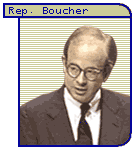 |
|||
 |
|||
During the first twenty years of operation, the Internet was a restricted
club of scientists, engineers, and administrators. Official policy for
the Internet forbid anyone from using the network for personal gain or
anything that didn't have a job-related function. That didn't stop
the real hackers, though. Online recreations were a common menace for the
network, filling up capacity with starship combat and menacing wizards.
Traffic for the Web, gopherspace, WAIS, and hytelnet was taking the majority
of the Internet's backbone, and little of it was essential to government
research.
Commerce was still taboo for everybody on the Internet. Hackers and
bureaucrats were in complete agreement that any commercialization of
the Internet would only lead to its demise. However, the power of
the Net was no longer a secret, and the business world was beginning
to wonder if there was a profit in the Internet.
However, U.S. law was standing in their way. Like the sooners crossing
the borders of the Oklahoma territory, some business was sneaking
across the network, but it was still illegal.
U.S. Rep. Frederick Boucher,
from the 9th district of Virginia, proposed to drop the restrictions
and give the Internet over to the citizens. In 1992, Boucher proposed
an amendment to the
National Science Foundation Act of 1950 that
"authorizes NSF to support the development and use of computer networks
which may carry a substantial volume of traffic that does not conform to
the current acceptable use policy."
Nobody had a real plan for making money on the Internet, but business
dunked a toe to test the digital water and dove in. Soon everyone
either had a Web site or was thinking of getting one. Internet Service
Providers (ISPs) and
Online Services
(like Compuserve and AOL) were outgrowing their capacity with new members.
Providing a connection to the Internet was a very profitable business, but
online commerce wasn't as profitable as the predicted.
It took a few years before business on the Web began to show a profit.
Online companies like
Amazon.com and
Excite.com were created just for
the Internet, based on revolutionary business models. Entreprenuers
had to look at business in a new way, and sometimes only the younger
minds could grasp the new concepts. The Internet has forced us to
rethink more than how we conduct business.
Copyright © 1998, PBS Online,
Inc. All Rights Reserved.![]() Open for Business
Open for Business

Site Designed and Developed by OPB Learning
Media